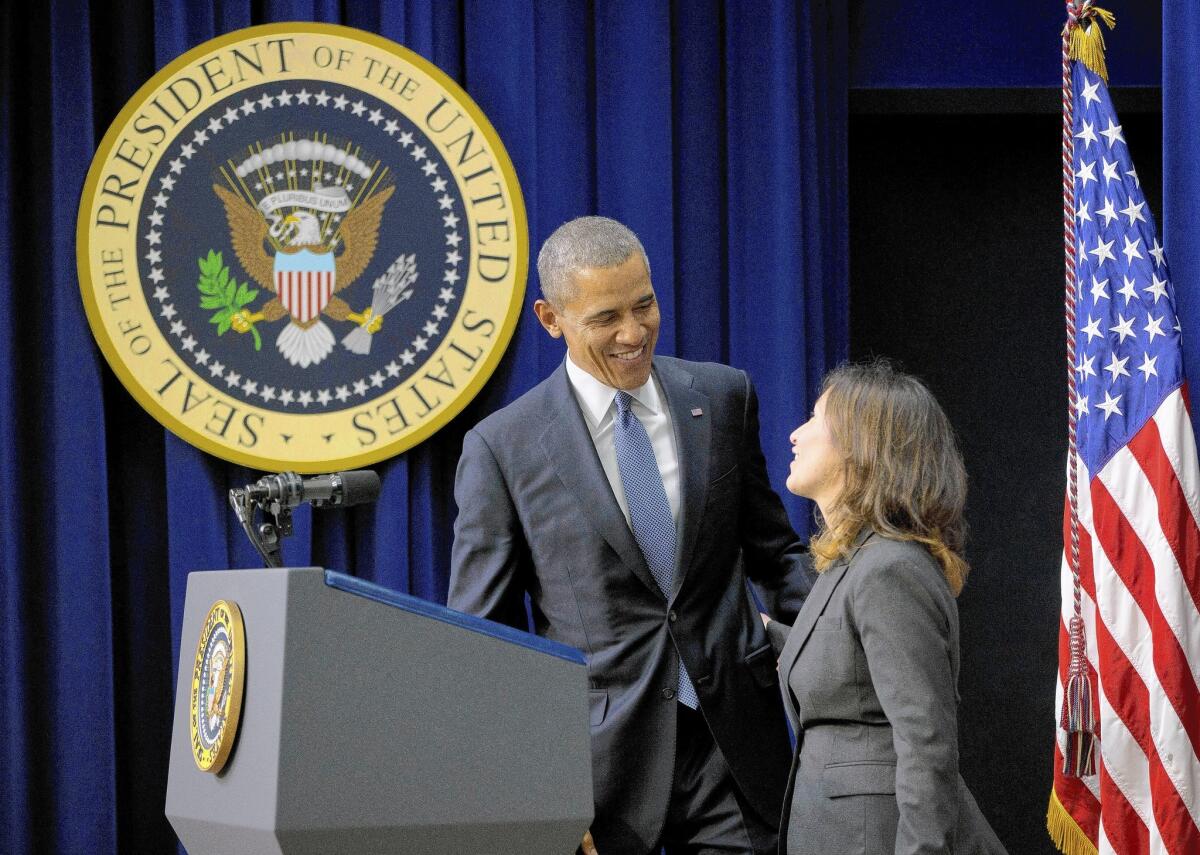Cesar Chavez’s legacy is at work in the White House

- Share via
WASHINGTON — When prominent Latino activists meet with President Obama, there’s one White House staff member present whom many of them have known since she was a child.
Julie Chavez Rodriguez grew up handing out leaflets and knocking on doors with her grandfather, Cesar Chavez, whose campaign to organize farmworkers still inspires today’s Latino leaders.
As deputy director of the Office of Public Engagement, Rodriguez runs Obama’s organizing efforts in support of immigration reform and supervises Latino outreach.
On Monday — Cesar Chavez Day in California, Colorado and Texas — she spoke about her family at a White House event to honor volunteers and community organizers from around the country.
“My grandfather used to tell us that the job of an organizer was to help ordinary people do extraordinary things,” Rodriguez, 35, told the crowd. “One of my favorite quotes from my grandfather says: ‘Once social change begins, it cannot be reversed. You cannot uneducate the person who has learned to read. You cannot humiliate the person who feels pride. You cannot oppress the people who are not afraid anymore.’”
Rodriguez usually keeps a much lower profile as a Chavez descendant. Her role is to defend the White House’s slow-and-steady approach to immigration reform while many activists have demanded Obama use his executive powers to stop deportations.
Two top Latino leaders recently branded Obama the “deporter in chief,” challenging the president’s argument that he can’t take further actions on his own but can only press Congress to pass legislation to overhaul the immigration laws.
In support of Obama’s view, Rodriguez cites “Tata Cesar” and his decades of organizing farmworkers. “My grandfather helped me to understand that change isn’t immediate,” she said. “It doesn’t happen overnight. It does take a lot of time and sacrifice. It takes consistent, sustained organizing and pressure to be able to see great progress in our country.”
Rodriguez was born in Delano, Calif., home of the Delano grape strike and not far from the Chavez family home where her mother, Linda, was raised. Rodriguez grew up mostly at the United Farm Workers headquarters, a small community named Nuestra Señora Reina de la Paz, or Our Lady of Peace, in Keene, in the Tehachapi Mountains.
She and her cousins used to accompany their grandfather as he sought to build his labor union. They joked that while other people went on family picnics, they went on family pickets.
Dolores Huerta, the legendary United Farm Workers leader, was often around, as was a young organizer named Eliseo Medina. Members of the Robert and John F. Kennedy families visited.
Her first jobs after Tehachapi High School, while on break from her Latin American studies at UC Berkeley, were in AFL-CIO union summer programs. She worked with the United Farm Workers organizing strawberry pickers in Watsonville, Calif.
She worked for eight years at the Cesar Chavez Foundation as a program director, but when Obama ran for office in 2008, she traveled to Colorado to volunteer, knocking on doors. That led to a job in the administration working for Interior Secretary Ken Salazar, followed by the White House in 2011.
Last year, she accompanied her boss to the National Mall to sit with Medina, who had recently stepped down as head of the Service Employees International Union, during his fast for immigration reform.
Rodriguez chose to remain outside the circle of fasters, noted Valerie Jarrett, head of the White House Office of Public Engagement. “Everyone in the tent knew who she was,” she said, “but she felt it was her role to be the staff that day.”
At the White House, conversely, most staff members don’t know they work with a member of the Chavez family.
Until two weeks ago, when the White House screened a new movie about Chavez, even White House Chief of Staff Denis McDonough was unaware of Rodriguez’s relation to Chavez or to his successor as head of the United Farm Workers: Arturo Rodriguez, her father. The elder Rodriguez was among the immigration activists present for a summit with the president two weeks ago.
Going into that meeting, the White House was miffed by the “deporter in chief” remarks from Rep. Luis V. Gutierrez, Obama’s fellow Democrat from Illinois, and Janet Murguia, president of the National Council of La Raza, the country’s largest Latino advocacy group.
Afterward, activists emphasized their shared agenda: to pressure House Republicans to allow a vote on comprehensive immigration reform.
Medina, an old family friend, said Rodriguez was an effective spokeswoman for the president.
“It is very important to have Julie at the White House as our country wrestles with the issue of immigration reform,” said Medina, who retired from the SEIU to dedicate himself to the issue. “Her personal story and family history make her uniquely qualified to help inform policymakers on why this issue matters to our nation and economy.”
Senior White House officials said Rodriguez’s message carried special weight.
“She and her cousins speak for the movement,” said Cecilia Muñoz, director of the White House Domestic Policy Council. “In the Latino community, it’s like knowing royalty. It’s a very powerful thing.”
More to Read
Sign up for Essential California
The most important California stories and recommendations in your inbox every morning.
You may occasionally receive promotional content from the Los Angeles Times.











